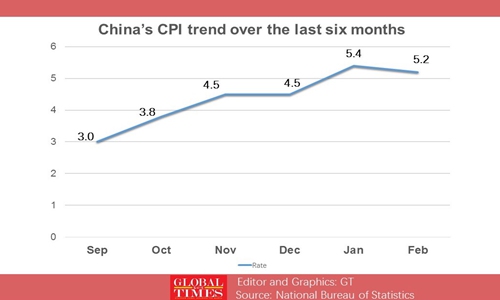HOME >> SOURCE
China's March CPI decelerates to 4.3% as supply stabilizes
By Ma Jingjing Source:Global Times Published: 2020/4/10 9:33:50

Customers shop in a supermarket in Taiyuan, north China's Shanxi Province, March 20, 2020. Life and production have gradually resumed here in Taiyuan under strict measures to prevent and control the novel coronavirus epidemic. Photo:Xinhua
China's consumer price index (CPI), a main gauge of inflation, continued to decelerate in March, mainly due to easing domestic fresh food inflation and transport and logistics returning to normal as the coronavirus has come under control within the country.
The index grew by 4.3 percent year-on-year in March, down 0.9 percentage points from February, the National Bureau of Statistics (NBS) said on Friday.
The index for the first quarter rose 4.9 percent year-on-year, according to the NBS.
A joint effect of increased supply of food and daily necessities, overall weak demand and an oil price slump contributed to the deceleration, Liu Xuezhi, a macroeconomics expert at Bank of Communications, told the Global Times.
According to the NBS, food prices rose 18.3 percent year-on-year in March, down 3.6 percentage points from the previous month. The pork price rose 116.4 percent year-on-year in the month, down 18.8 percentage points from February.
Non-food prices rose 0.7 percent year-on-year in March, down 0.2 percentage points month-on-month.
As the virus prevention and control situation continues to improve domestically, food price growth has decelerated due to sufficient supply and reduced logistics and transport costs, according to Dong Lijuan, a senior statistician of the NBS.
Looking ahead, Liu said the country's CPI is likely to ease back in the second half of 2020, with the year-round growth rate expected at 4 percent.
Given that international prices of staple grains - rice and wheat - gained amid COVID-19, some Chinese consumers are concerned about potential food prices domestically.
Wang Bin, an official with the Ministry of Commerce, said on April 2 that there is no need for consumers to worry about grain shortages or price rises because the country's grain production is sufficient and major processing companies have posted sound business resumption.
Tian Yun, vice director of the Beijing Economic Operation Association, told the Global Times that the impact of the coronavirus on domestic farming is slight and the country's CPI may further drop to around 3 percent alongside easing panic brought about by the pandemic.

China's CPI soared to 5.4 percent year-on-year in January, the highest level since November 2011. The figure edged down to 5.2 percent in February - still relatively high compared with normal conditions.
Amid the virus, domestic consumption dropped. Deputy head of the NBS Sheng Laiyun said in an article in March that a conservative estimate of retail losses for January and February is over 1.5 trillion yuan ($212.68 billion), with tourism, hospitality, transportation and entertainment hit the hardest.
As domestic manufacturing activities begin on a recovery trajectory and economic and trade shocks from the global pandemic intensify, the price of industrial materials continues its deflationary trend. The country's producer price index (PPI), which measures the cost of goods at the factory gate, was further down 1.5 percent year-on-year in March, compared with a 0.4 percent fall in February, according to the NBS.
RELATED ARTICLES:
Posted in: MARKETS